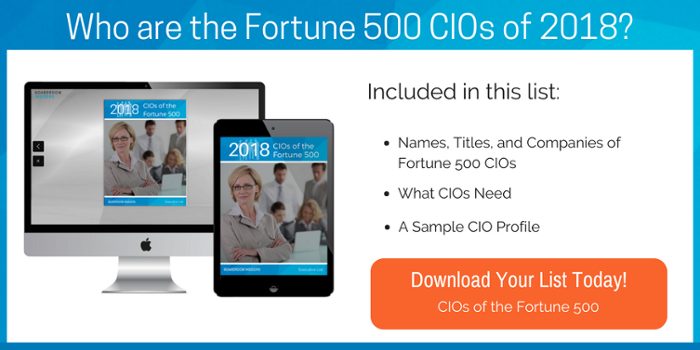.png?width=700&height=400&name=Recruiting%20the%20Right%20CIO%20(2).png)
Is the CIO you’re checking out for a client evolutionary or revolutionary?
Is he or she a top, typical, or trailing performer in digitalization?
These are among the questions you should be addressing as you consider candidates for corporate clients. Just because the person you’re placing has been a CIO for one company doesn’t mean he’s working on the same kind of initiatives as the CIO of another company. What have his mandates been? Who has she been reporting to? Are they tech forward or business forward?
The same kinds of questions have to be asked of a corporate client in the context of what they’re seeking in a candidate. How do they define the role of a CIO? Is the CIO strictly a tech implementer and problem solver or has the role evolved into a business partner?
And here’s another piece of information to absorb: 95 percent of CIOs expect their jobs to change or be remixed, thanks to digitalization. This comes from research firm Gartner, which just released its annual comprehensive survey, the 2018 Gartner CIO Agency Survey. What they found this year can help direct the approach you’ll take both with CIOs and clients in search of a CIO.
The survey reveals that while 95 percent of 3,000-plus CIO respondents still have a mandate to deliver world-class IT, that’s going to be less a part of their specific day-to-day function than becoming a change leader. Essentially they will be expected to be experts in innovation management and talent development. As the business grows, CIOs must do more than supply IT services, they must be, in Gartner’s words, “impactful business leaders”—doing this by controlling costs, improving processes, exploiting data, driving revenue, and scaling digital business.

"The CIO's role must grow and develop as digital business spreads, and disruptive technologies, including intelligent machines and advanced analytics, reach the masses," said Andy Rowsell-Jones, vice president and distinguished analyst at Gartner. "While delivery is still a part of the job, much greater emphasis is being placed on attaining a far broader set of business objectives."
Here are some key takeaways from the Gartner survey:
- CIOs are routinely driving business outcomes in partnership with business leaders. At least 84 percent of the CIOs surveyed say they now have responsibility for areas outside traditional IT and many reported they are close to an “ideal balance” with more focus on business outcomes rather than IT delivery. Their roles are transitioning from controlling costs and engineering processes to driving revenue and exploiting data.
- More than a quarter say their primary priority is growth, using digitized products and services to drive new forms of revenue, business value, and customer engagement.
- Cybersecurity and artificial intelligence are tech trends that CIOs believe will significantly change how they will do their jobs in the future, while AI, digital security, and the Internet of Things are deemed the most problematic to implement.
But here’s the thing. These findings have to be put in the context of where your client organization is. And where each CIO candidate is in his or her career. Survey respondents were categorized as top, typical, and trailing performers in digitalization.
The big news, obviously, comes from the top performers. But your client—whether CIO or company—may not fall into that category. You can’t assume that individual or organization is on the cutting edge. Being revolutionary may not be the mandate she had been given by the CEO.
.png?width=640&name=Recruiting%20the%20Right%20CIO%20(3).png)
Do yourself a favor and research the CIO, the CEO, and the organization itself when working with a CIO. Learn who the CIO reports to. Identify her priorities and the priorities of the CEO she’s currently working for. To do that, look at what the company’s executives are saying on earnings calls. Is the CEO calling out technology, innovation and digital as investment priorities? Or is the focus primarily on cost cutting? These things can give you a clue as to how you should focus your conversation for maximum relevance.
Do the same with your corporate client. It could also be that they’re strictly all about cost cutting and efficiency or fixing problems—or somewhere in the middle. But if they’re not focused on innovation, that’s a different conversation and you need to be prepared to identify a talent who can tackle that. Your research will give you the tools to be relevant and truly helpful to your clients as you look ahead to 2018.







Share Your Thoughts